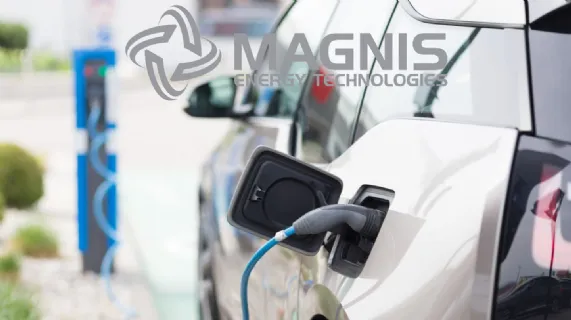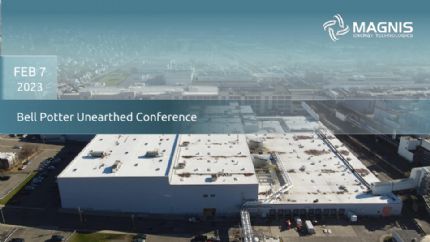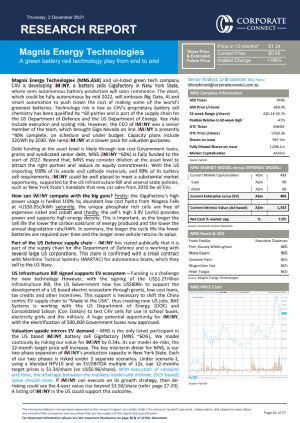 IM3NY Cell Certification Update
IM3NY Cell Certification Update
Sydney, June 2, 2023 AEST (ABN Newswire) - Magnis Energy Technologies Ltd ( ASX:MNS) (
ASX:MNS) ( U1P:FRA) (
U1P:FRA) ( MNSEF:OTCMKTS) is pleased to provide an update on the UN38.3 certification process for cells produced by iM3NY. Magnis is the major shareholder of iM3NY.
MNSEF:OTCMKTS) is pleased to provide an update on the UN38.3 certification process for cells produced by iM3NY. Magnis is the major shareholder of iM3NY.
- iM3NY has successfully completed 6 out of the 7 relevant tests for UN38.3 certification, with 1 result now pending
- Cells are currently in the final (T8) test and will be deemed concluded after a 7-day observation period
- UN38.3 certification is an internationally recognised standard established by the United Nations for the transportation of lithium-ion cells
- An official report regarding compliance to UN 38.3 certification is expected within 2 weeks
To date, 6 tests have been successfully completed. One last test is underway, which is the Forced Discharge process. This final test (T8) has commenced and is expected to conclude after a 7-day observation period. An official report regarding compliance to UN 38.3 certification is then expected within 2 weeks.
Magnis is pleased to report that the thermal test (which was non-compliant in earlier testing) has now been passed.
UN/DOT 38.3 Transportation Testing Overview
Lithium cells are classified as dangerous goods and can pose a safety risk if not tested and packaged in accordance with the transport regulations. UN/DOT 38.3 testing helps ensure the safety of lithium ion or lithium metal cells during shipping.
The transport of lithium cells is subject to national and international regulations as detailed by the UN (United Nations) in the U.N. Manual of Tests and Criteria, Sub-section 38.3 (UN 38.3, UN International Air Transport Association (IATA), and the United States DOT (Department of Transportation) which defines shipping regulations for the U.S. under 49 CFR, Sections 100 - 185. UN/DOT 38.3 details environmental, mechanical, and electrical requirements for all lithium cells and batteries. Manufacturers of lithium batteries and products using lithium cells must demonstrate compliance in the design, manufacturing, and distribution of their products.
UN38.3 Certification Process
The UN38.3 certification process involves a series of tests that are designed to simulate the conditions that the cells may be exposed to during transportation. These tests include:
T1. Altitude Simulation: Low pressure testing that simulates unpressurised airplane cargo area at 15,000-meter altitude. After storing cells at 11.6kPa for >6 hours, these criteria shall be met: no mass loss, leaking, venting, disassembly, rupture or fire, and voltage within 10% of pre-test voltage.
T2. Thermal Cycling: The test covers changes in temperature extremes from -40C to +75C. Cells are stored for 6 hours at -40C (12 hours for large cells/batteries), then 6 hours at +75C (12 hours for large cells/batteries), for a total of 10 cycles. T2 tests the cell seal integrity and internal connections.
T3. Vibration: Test simulates vibration during transportation. The test is a Sine Sweep: 7Hz - 200Hz - 7Hz in 15 Minutes; 12 Sweeps (3 hours); 3 mutually perpendicular axes.
T4. Shock: Test robustness of cell under cumulative shock during transportation. Test is a HalfSine pulse: 50g/11ms for large cells/batteries; 3 pulses per direction; 6 directions (+/-z, +/-x, +/- y).
T5. External Short Circuit: This test simulates an external short circuit to the terminals of the cell or battery. At temperature of +57C, apply short circuit (<0.1ohm) across terminals. Maintain at least an hour after sample temperature returns to +57 +/-4degC. Pass criteria are: Case temperature does not exceed +170degC and no disassembly, rupture, or fire within 6 hours of test. Fuse, current limiting circuit, and venting mechanism activation are allowable.
T6. Impact: This test simulates mechanical abuse from impact or crush.
T8. Forced Discharge: A sample is forced discharged at ambient temperature at an initial current equal to the maximum discharge current specified by the manufacturer and for a calculated time interval.
Once the cell has passed all tests, it can then be considered UN38.3 certified.
*To view tables and figures, please visit:
https://abnnewswire.net/lnk/8813CG86
About Magnis Energy Technologies Limited
 Magnis Energy Technologies Limited (ASX:MNS) (OTCMKTS:MNSEF) (FRA:U1P) is involved in and has strategic investments in several aspects of the electrification supply chain including manufacturing of green credentialed lithium-ion battery cells, leading edge battery technology and high quality, high performance anode materials. The company's vision is to enable, support and accelerate the green energy transition critical for the adoption of Electric Mobility and Renewable Energy Storage.
Magnis Energy Technologies Limited (ASX:MNS) (OTCMKTS:MNSEF) (FRA:U1P) is involved in and has strategic investments in several aspects of the electrification supply chain including manufacturing of green credentialed lithium-ion battery cells, leading edge battery technology and high quality, high performance anode materials. The company's vision is to enable, support and accelerate the green energy transition critical for the adoption of Electric Mobility and Renewable Energy Storage.



![abnnewswire.com]()
Related Companies
Social Media
Share this Article

 ASX:MNS) (
ASX:MNS) ( U1P:FRA) (
U1P:FRA) ( MNSEF:OTCMKTS) is pleased to provide an update on the UN38.3 certification process for cells produced by iM3NY. Magnis is the major shareholder of iM3NY.
MNSEF:OTCMKTS) is pleased to provide an update on the UN38.3 certification process for cells produced by iM3NY. Magnis is the major shareholder of iM3NY.  Magnis Energy Technologies Limited (ASX:MNS) (OTCMKTS:MNSEF) (FRA:U1P) is involved in and has strategic investments in several aspects of the electrification supply chain including manufacturing of green credentialed lithium-ion battery cells, leading edge battery technology and high quality, high performance anode materials. The company's vision is to enable, support and accelerate the green energy transition critical for the adoption of Electric Mobility and Renewable Energy Storage.
Magnis Energy Technologies Limited (ASX:MNS) (OTCMKTS:MNSEF) (FRA:U1P) is involved in and has strategic investments in several aspects of the electrification supply chain including manufacturing of green credentialed lithium-ion battery cells, leading edge battery technology and high quality, high performance anode materials. The company's vision is to enable, support and accelerate the green energy transition critical for the adoption of Electric Mobility and Renewable Energy Storage.








